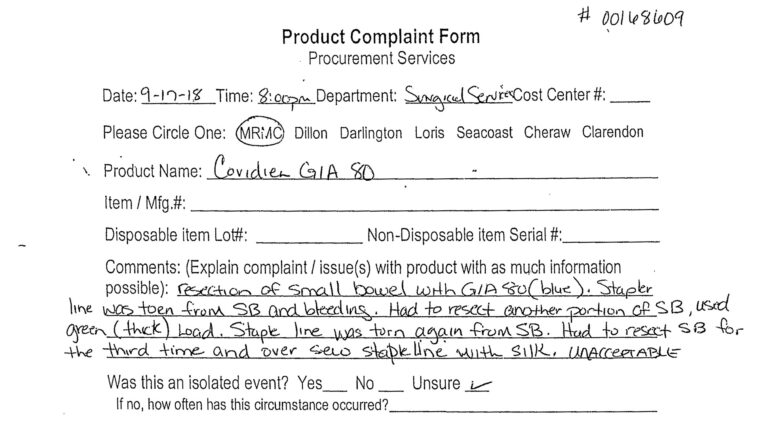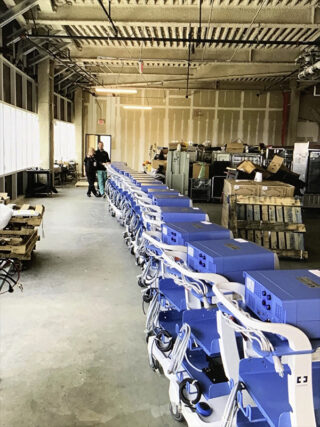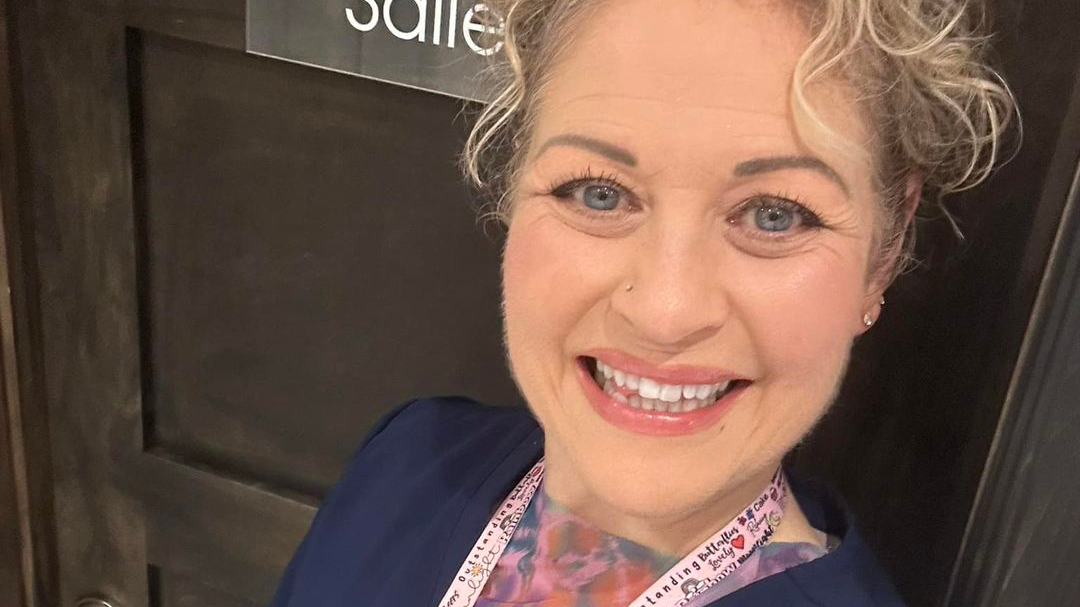
Late in the summer of 2018, several surgeons at McLeod Regional Medical Center in Florence, South Carolina, grew increasingly concerned about the quality of a vital surgical tool they relied on in their operating rooms. The GIA 80 surgical skin stapler, produced by Covidien, a subsidiary of medical tech giant Medtronic, did not properly hold incision edges together or the internal knife malfunctioned during appendectomies and other critical surgeries, the doctors said. This led to unnecessary and sometimes dangerous bleeding in patients.
In September 2018, Cary Brewton, a McLeod general surgeon, wrote on a product complaint form that “as stapler approximated, it tore SB [the patient’s small bowel]” three times. Each time, Brewton had to cut out more of the bowel to repair the tears, he wrote. “UNACCEPTABLE,” Brewton added in capital letters on the complaint form. He suggested that the medical center return to a type of stapler they had used previously — one produced by a Medtronic competitor — that hadn’t caused such problems.
On the same day, another McLeod surgeon, Keith Player, requested hospital procurement managers “return” to staplers produced by the same Medtronic competitor. During an appendectomy, Player had observed “pulsatile arterial bleeding @ staple line,” he wrote in a complaint.
Before Brewton and Player’s complaints, McLeod surgeon John Richey had expressed similar frustrations about patient injuries caused by a faulty Medtronic GIA 80 stapler. “Bleeding from anastomosis requiring transfusion and possible take back,” Richey wrote in his complaint, referring to a surgical procedure in which two blood vessels or other structures are connected. He also noted that the malfunction resulted in “additional medical intervention.”

In an email to hospital managers, Medtronic representatives acknowledged the medical staff’s concerns but made no mention of patient injuries. Instead, they suggested switching to a different Medtronic stapler.
The product complaint forms detailing the incidents at McLeod, as well as Medtronic’s responses to the physicians, are part of a recently unsealed court case against the medical equipment giant, brought by former Medtronic sales representative Leanne Houston. Between 2016 and 2018, Houston says she was privy to Medtronic engaging in “unlawful conduct,” as she characterizes it in the complaint. Among other things, she says the company covered up problems with certain models of surgical staplers and illegally paid physicians and six hospitals in the McLeod Health network and at other hospitals “in the form of millions of dollars’ worth of free medical equipment” so that they would “commit to only using Medtronic’s surgical products, and ending relationships with other suppliers.”
“Medtronic put profit before patients,” Houston alleges in her complaint. “The entire business model for Medtronic revolved around giving kickbacks to induce a hospital or surgeon to purchase its devices even if they were more expensive or medically unnecessary, or even harmful to a patient.”
Houston filed the lawsuit under seal in 2020, after she was fired, she says, for “speaking out regarding fraud, device concerns and patient safety.” The case became public in late 2023, when the U.S. Department of Justice announced its decision not to intervene, without providing a specific reason.
A spokesperson for Medtronic did not respond to specific questions from the International Consortium of Investigative Journalists (ICIJ), but wrote in an email that the company “is committed to the highest patient safety standards and ethical business practices” and that it “fully cooperated with the Department of Justice during its three-year investigation into the allegations.”
Representatives for the DOJ and McLeod Health hospital network, a defendant in the lawsuit, did not respond to ICIJ’s repeated comment requests.
Implant Files revelations
Medtronic, headquartered in Minneapolis, Minnesota, is the world’s largest medical device company; in 2022, it declared more than $31 billion in revenue. It’s also no stranger to accusations of kickbacks and other misconduct.
In 2018, ICIJ’s Implant Files investigation found that governments on four continents had accused Medtronic of promoting unauthorized uses of products, defrauding government health programs, price fixing, paying doctors for favorable studies and engaging in anti-competitive conduct.
The case being brought by Houston, the former Medtronic sales representative, is the latest in a series of lawsuits against the medical device maker. Between 2011 and 2020, Medtronic and its subsidiaries paid more than $60 million to settle fraud or kickback allegations, according to a recent report by CNBC.
ICIJ’s Implant Files investigation found that during those years Medtronic also developed new strategies to gain market share. The company expanded into new areas of medicine, partnering with various healthcare providers in a bid to become the exclusive supplier of a range of medical devices and services. These so-called “partnerships” were secured by lobbying government officials and hospital administrators, as well as lavishing expensive gifts on doctors, according to accounts by former Medtronic employees — tactics also described in Houston’s complaint.
When ICIJ and its Implant Files’ reporting partners in Switzerland, the United Kingdom, Italy, Mexico, Canada and the United States requested information about these “partnerships” from some of Medtronic’s customers, the hospitals provided limited information, often citing confidentiality.
In a 2018 statement to ICIJ, a Medtronic spokesperson said the company does “not control or direct healthcare professionals’ decision-making when it comes to patient care, the indications for procedures, the use of technology in patient care, or the selection of specific medical devices.”
Houston’s unsealed lawsuit provides rare insight into the details of Medtronic’s partnerships with hospitals.
In a January 2024 response to ICIJ, the company again denied wrongdoing. Medtronic’s “partnerships with hospitals and physicians, including sales practices, follow all applicable reporting laws and regulations,” a spokesperson wrote.
Hospital conversion
In February 2018 a truck delivered 39 Medtronic Valleylab FT10 generators worth $636,987 to McLeod Regional Medical Center. Houston and two Medtronic colleagues — including her supervisor, sales manager Barrett Garner — unpacked, assembled and delivered the generators, meant to power the surgical devices used to seal veins and arteries.
A hospital department manager seemed surprised by this, according to Houston’s account. It was the first time that employees from a medical device company had unloaded cargo for the hospital, the manager allegedly told Houston — a task usually done by hospital staff.
The gesture by the Medtronic representatives was not out of generosity: It was part of a Medtronic strategy called “hospital conversion.”

A few weeks before, McLeod Medical Center had signed a contract to buy a certain number of Medtronic surgical products. In exchange, the lawsuit says, Medtronic would give the hospital the new generators for free.
“We were very intentional in locking out the competition and forcing the conversion,” Houston told ICIJ. “I didn’t realize we were buying the business with kickbacks.”
McLeod Medical Center was one of 11 healthcare facilities in the U.S. that received the new generators at no cost, according to an internal spreadsheet described in the lawsuit. Medtronic aimed to replace old generators, the ForceTriad energy platforms, with the new machines — ones that only worked with new Medtronic products. This would “force unwilling surgeons to switch to Medtronic’s devices,” according to the complaint.
The goal was to get the surgeons ‘hooked’ on the better technology and gradually raise the prices.
— Former Medtronic sales representative Leanne Houston
A veteran Medtronic sales manager emphasized in an email to the staff how lucrative the deal with McLeod hospital network could be for the company. “Successful conversion here at McLeod will bring $2.2 [million] in total revenue growth and have other large regional impacts as well,” he wrote.
To help Medtronic gain market share, its sales representatives provided “kickbacks” to hospitals and gave away expensive medical equipment with the “fraudulent name” of “samples,” “loaners” or “demo units,” Houston says in the complaint.
“Medtronic offered impressive ‘creative’ rebates,” Houston alleges. “The goal was to get the surgeons ‘hooked’ on the better technology and gradually raise the prices.”
As the sales representative leading the “conversion,” Houston said she was “mandated” by her managers “to oversee … suggesting stocking orders, removing the competitive products from all areas of each hospital [and] isolating the preferred products so the surgeons could only be given [the competitors’ devices] as a last resort.”
“Most surgeons were furious they were not consulted,” Houston told ICIJ.
On at least one occasion, she recalled, a surgeon was not able to use his preferred device, made by a Medtronic competitor, because Houston had removed it. “It made me feel extremely uncomfortable when the patient was anesthetized, having surgery, and the surgeon was yelling for his or her preferred product (that they believed would provide [the] best outcomes), and I was not allowed to give it to them,” Houston said.
A ‘rush’ of incidents
Houston’s career with Covidien, now a Medtronic subsidiary, started in 2013 after years of working for other medical device companies, where she launched new products and trained sales recruits. As a sales representative in Medtronic’s surgical division, Houston routinely trained and assisted physicians in using Medtronic medical devices during surgeries. She also handled the logistics of large-scale sales.

During her years at Medtronic, Houston earned accolades and was praised by her supervisors. An annual evaluation characterized 2018 as “a strong and record year” for Houston. Her main achievement: “Successful full line conversion of 6 McLeod hospitals.” “Leanne successfully addressed and handled surgeon resistance to change, training and adoption of new technology, price issues,” wrote her supervisor, Garner. She was “off to a strong start for FY19,” he added. He later promoted her to senior sales executive.
Then, Houston told ICIJ, the surgical stapler problems began.
Starting in late August 2018, seven McLeod surgeons, whom Houston regularly assisted, began to complain about the GIA 80.
“I wonder if we have a bad lot of GIA staplers,” Houston wrote in a text to the hospital’s operating room supervisor.
Just four months before, Medtronic had issued a recall for two of its surgical stapler models, the Endo GIA 45 and the Endo GIA 60, due to a misassembled component that could potentially result in patient injuries. In an internal document, the company said bleeding was one of the possible negative outcomes associated with these devices and that it had received five reports of injuries associated with the products.
“The risk of patient harm does exist as using affected product may result in failed anastomosis, bleeding, tissue trauma and the potential for conversion to an open procedure as a result of no staples being deployed,” says the document detailing the recall.
Houston feared that similar issues might plague the GIA 80 stapler used by McLeod surgeons.
“My patients had more injuries than the recalled devices,” Houston told ICIJ. Over 41 days, between August and October, she collected 10 reports on injuries. Some were so severe that they required additional surgeries, according to the complaint.
At least two surgeons — on two separate occasions — called Houston in the middle of the night, requesting her immediate help after they observed the Medtronic stapler allegedly malfunctioning during emergency surgeries, she said.
Patient safety is unequivocally a paramount priority, and any suggestion otherwise is false.
— A Medtronic spokesperson in a statement to ICIJ
Houston says she repeatedly reported her concerns to Medtronic senior executives, including a company medical director and her supervisors, but they told her to be quiet. “Medtronic pursued a cover-up of the problem rather than properly reporting it and dealing with the FDA,” she alleges in the lawsuit.
Medtronic’s spokesperson rejected the allegations and told ICIJ that “[p]atient safety is unequivocally a paramount priority, and any suggestion otherwise is false.”
Houston also said she filed a report for each injury she was aware of and uploaded the reports to an internal Medtronic database. The company was required by law to report the incidents to the U.S. Food and Drug Administration.
Medtronic did not respond to ICIJ’s questions on whether its staff submitted the reports to regulators.
Between 2013 and 2023, there were about 2,000 reports of incidents associated with the GIA 80 stapler — including malfunctions, injuries and deaths, according to an analysis of the FDA’s public incident database by Madris Kinard, a medical device surveillance expert and former adverse event analyst at the agency.
But the scale of the problem may be even bigger. According to a 2019 investigation by KFF Health News, until 2018, a loophole in the FDA rules allowed manufacturers — including Medtronic — to submit incident reports involving some devices, such as surgical staplers, to a nonpublic database.
This is only one of “the hurdles that have been put in along the way, some by the FDA and some by Medtronic,” which prevent the public from having a clear understanding of the problems associated with this type of device, Kinard told ICIJ.
Medtronic fired Houston in January 2019, citing performance issues.
Houston denies the allegations and accuses the company of wrongful termination. “They ruined my career, my finances, my reputation,” she told ICIJ.
Before what she calls a “rush” of incidents involving some of the staplers she had sold to the McLeod hospitals, Houston had “loved and long admired” Medtronic.
“I would never have taken a position with a company that puts profit above patient safety. Ever,” she said. “It’s a privilege to work with a company like Medtronic when you don’t know all the bad things they do.”








